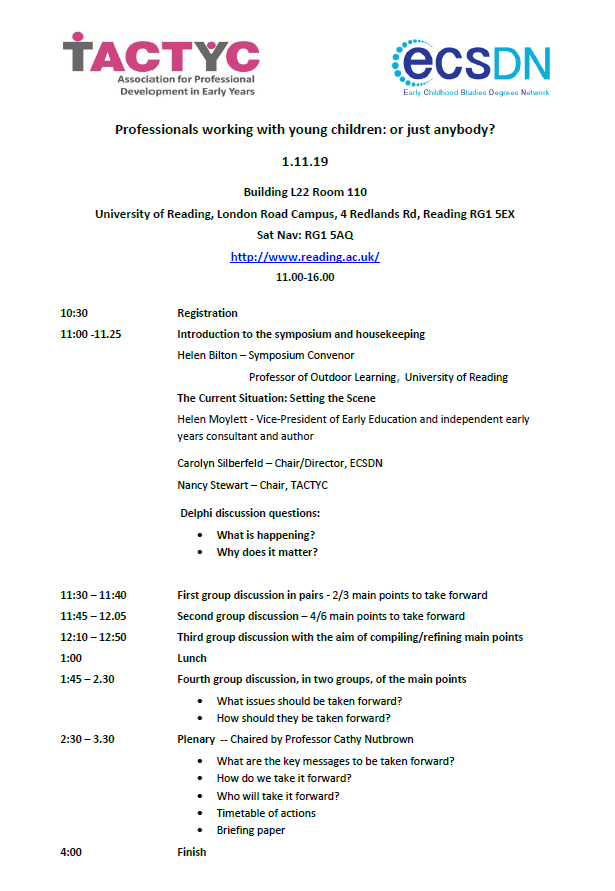This blog post is written by Prof. Helen Bilton (Professor of Outdoor Learning), a research expert in early years education. In this blog post, Prof. Bilton reflected on a symposium which she recently convened at the Institute of Education, University of Reading.
Early childhood education is in crisis. The proportion of totally unqualified staff working in nurseries has increased to over a quarter of current practitioners. Fewer and fewer nurseries are employing graduates. The number of Level 3 staff working in nurseries dropped from 83% to 52% in three years. Those wishing to become or work with young children is falling. Nursery staff in poverty and visiting food banks can be advising parents in poverty and visiting food banks.
On Friday 1 November 2019, a number of experts came together at the University of Reading to discuss this topic; what is happening and why it matters and then deciding on a way forward. There were people from all areas of the early years workforce and all areas of the country, including Higher Education, Further Education, schools, and students. Professor Cathy Nutbrown (Professor of Education, University of Sheffield) acted as our chair.

The event was consciously designed as a symposium, which is a meeting organised so experts can discuss a particular academic topic. Those attendees were there to work and come to some sort of consensus. We adopted the Delphi technique, which has been described as a “method for structuring a group communication process so that the process is effective in allowing of group of individuals as a whole, to deal with a complex problem” (Linstone & Turoff, 1975, p. 3). The technique is iterative and aims to get a broad range of opinions, importantly allowing everyone to contribute many ideas for others to discuss and reflect upon.
We ended with some key messages. Key among these were that we need a cultural shift as to how we view children. Society needs to see childhood as a continuous process and everyone needs to value the child and childhood and not see them or it as something to get through to achieve adulthood. It is so much more. Children should be seen and heard. Valuing the child means staff will be valued. We decided we need a proper long-term plan for our future, that is for our children and their education. It was even suggested we need some form of professional body similar to the law or medicine which can represent our views. A lovely quote from Tricia David summarised our thinking, we need “strong, capable, confident and self-assured” children and therefore we need “strong, capable, confident and self-assured” staff working with those children.
Our next steps are to write a briefing paper and to start a hard-hitting social media campaign, as enough is enough.

I applaud your efforts to explore this complex subject and your determination to be proactive in finding a way forward.
I would like to ask how you are going to ensure the opinion of, and suggestion from a wider audiance are consider. Specifically people like me who due to ill health can no longer attend meetings, and people who due to work or family commintments can not attend ( as is often the case for childminders).
Will you be considering seeking views via email or online discussion or questionnaires or other methods?
Will face to face meetings be in different parts of the country to ensure reduced travel for those who are time or finanically poor?
Or do you intend to cascade information to a wider audiance with opportunties to respond much as you have with this blog?
As you may have realised I am keen to be involved and have been a life long advocate for children and their rights but now sadly health prevents me travelling as much as I would like.
Hi Penny
Good point and good you have raised it.
Can you leave it with me to discuss with the others and then come back to you?
We are trying to formulate a plan from the symposium and a social media campaign.
So contributions like yours at this point are really helpful.
Helen
It is brilliant that you have initiated this day Helen, chaired by Cathy. It is indeed much needed. The workforce situation is desperate, So thankyou for the debate you are taking forward and for the blog. I liked Tricia’s words ” the need for strong, capable, confident, and self assured staff”. “Strong” can certainly mean “capable, confident and self assured”. But strong should also mean the capacity of a workforce able sometimes to let go of capability, confidence, and self assurance so that there is space for uncertainty and vulnerability too. That seems to me essential given the complexity of the workforce issues in a diverse society. So a key question for me is how to develop a workforce that can manage different ways of being “strong”.